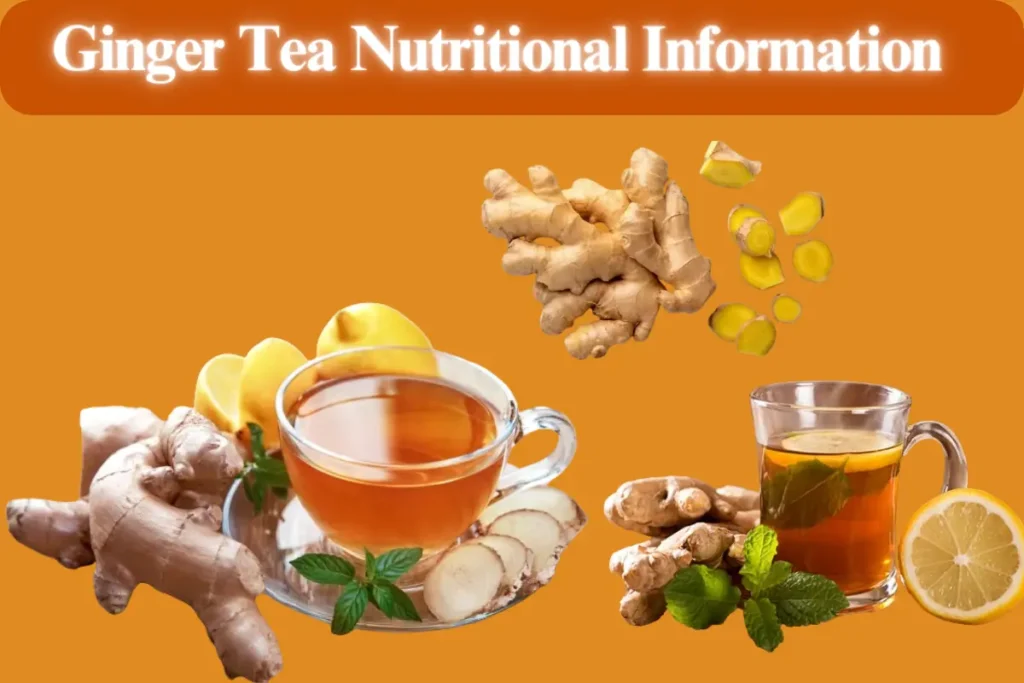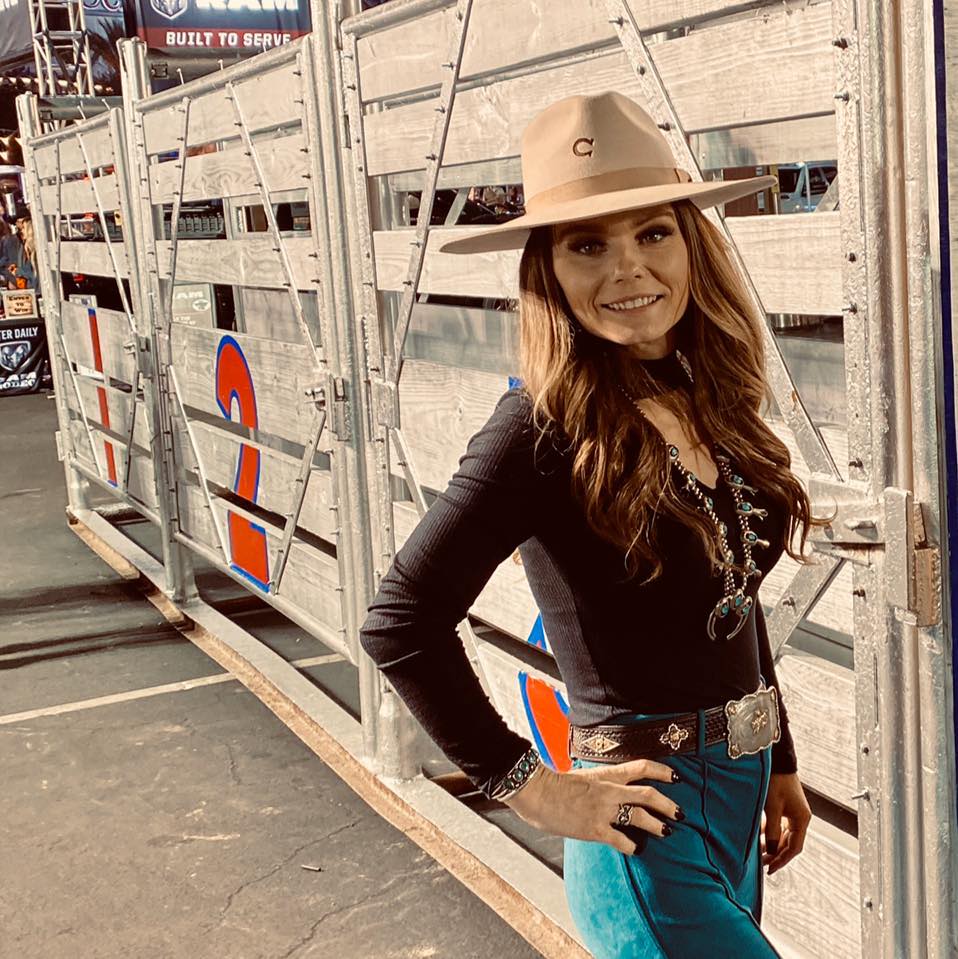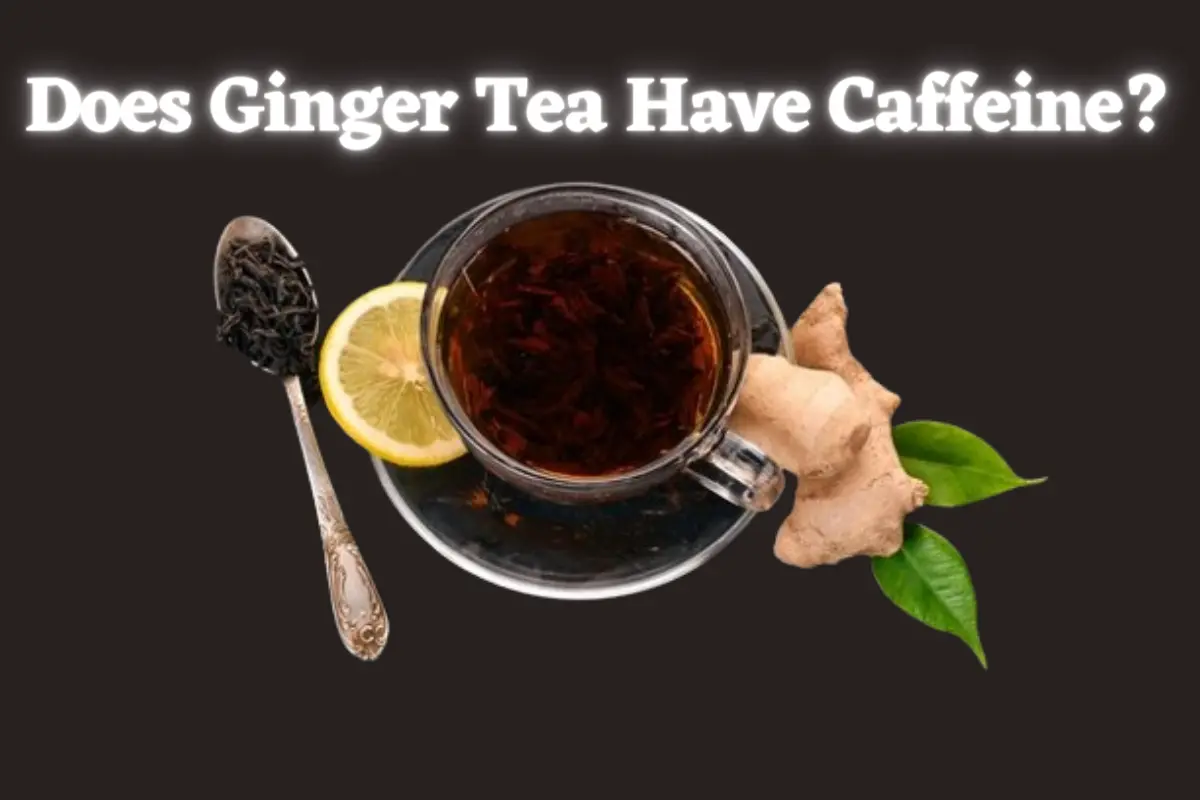Did you know that an ancient remedy for seasickness and upset stomachs is now a trendy beverage enjoyed worldwide? Ginger tea, celebrated for centuries in traditional medicine, offers a warm, spicy flavor and potential health benefits.
This cozy drink is known to soothe nausea and aid digestion, sparking curiosity among health-conscious individuals. But for those seeking a caffeine-free option, a crucial question arises: Does ginger tea have caffeine?
Importance of Knowing About Ginger Tea
Ginger tea enjoys widespread popularity across the globe, consumed for its warming flavor and potential health benefits. Its perceived benefits include easing nausea, aiding digestion, and offering anti-inflammatory effects.
However, understanding the caffeine content in ginger tea is crucial, especially for individuals sensitive to caffeine or seeking a caffeine-free option for relaxation or health reasons.
A common misconception is that all teas, including herbal teas like ginger tea, contain caffeine. This is not the case, as herbal teas often do not come from the Camellia sinensis plant and do not contain caffeine unless specifically blended with caffeine-containing teas or ingredients.
While pure ginger tea (ginger + hot water) is naturally caffeine-free, it’s essential to note that variations exist. Some blends might incorporate caffeinated tea leaves like black or green tea, adding caffeine to the beverage. Additionally, pre-packaged ginger teas could contain other ingredients which might influence caffeine levels.
Certain individuals, such as pregnant women, those with specific medical conditions, or those taking certain medications should consult their doctor before consuming ginger tea to avoid potential interactions or adverse effects.
Does Ginger Tea Have Caffeine?
No, Pure ginger tea is inherently caffeine-free because it comes from a completely different plant source than traditional teas.
Black, green, oolong, and white teas all originate from the Camellia sinensis plant, which naturally contains caffeine.
Contrarily, ginger tea is an herbal infusion crafted from the root of the ginger plant (Zingiber officinale) and does not contain caffeine. This makes it an excellent option for those desiring a flavorful beverage without the stimulating effects of caffeine.
Here’s why this distinction matters
Evening Relaxation
Ginger tea can be a wonderful part of a nighttime routine, helping you unwind without the worry of caffeine-induced sleep disruption. It offers a warm, soothing experience that can promote relaxation.
Caffeine Sensitivity
Individuals sensitive to caffeine can enjoy ginger tea without experiencing jitters, anxiety, or other side effects associated with caffeine consumption. This makes it a suitable option for those who need to manage their caffeine intake.
Variety
Ginger tea offers a delicious and satisfying alternative for those who want to reduce their caffeine intake or explore various caffeine-free beverage options. Its unique, slightly spicy flavor profile adds diversity to your hot beverage choices.
Important Consideration
While pure ginger tea is caffeine-free, be aware that some commercial blends might incorporate caffeinated tea leaves like black or green tea. Always check the ingredients list carefully if you’re looking for a strictly caffeine-free ginger tea experience.
Ginger Tea Variants and their Caffeine Content
There are several variants of ginger tea, each offering its unique flavor profile and potential health benefits. Some popular ginger tea variants include:
Pure Ginger Tea
The foundation of all delicious ginger teas remains the classic – fresh or dried ginger root steeped in hot water. This provides the most potent ginger flavor and ensures zero caffeine content.
Ginger-Lemon Tea
Adding lemon to your ginger tea is a fantastic way to introduce a bright, citrusy note. Lemon, like ginger, is caffeine-free, making this a refreshing and revitalizing choice at any time of day.
Ginger-Turmeric Tea
This earthy, anti-inflammatory powerhouse is revered for its potential health benefits. Pairing turmeric with ginger creates a warming, flavorful tea without any caffeine.
Herbal Ginger Blends
Ginger stars in many caffeine-free herbal teas. It pairs wonderfully with soothing chamomile for relaxation, invigorating mint for an extra kick, or a blend of other calming herbs. Check the ingredients list to be sure no traditional tea leaves (from the Camellia sinensis plant) are included.
Ginger Green Tea
This popular blend delivers the antioxidant benefits of green tea along with ginger’s zest. Remember that green tea has a moderate caffeine content (around 28mg per cup).
Ginger Black Tea
If you desire a bolder, more robust flavor, black tea’s higher caffeine content (around 47mg per cup) and ginger’s warmth create a satisfying combination.
Flavored Ginger Teas
Be mindful of pre-packaged flavored ginger teas. Some use a tiny amount of black or green tea as a base for their flavorings, introducing a small dose of caffeine. Always read the ingredients list thoroughly.
List of Ingredients in Ginger Tea
The list of ingredients in ginger tea typically includes:
The Heart of Ginger Tea
- Ginger Root: This remains the essential ingredient, providing the defining flavor and potential health benefits of any ginger tea. You can experiment with:
- Fresh Ginger: Sliced or grated, this delivers the most vibrant, potent ginger flavor. Consider leaving the skin on for added intensity.
- Dried Ginger: Convenient and readily available, offering a slightly less intense flavor than fresh, with a longer shelf life.
- Ground Ginger: While less common in tea blends, it can be used to impart a subtle ginger note.
Enhancements for Pure Ginger Tea
- Lemon: A classic addition, lemon brightens the tea with a zesty citrus flavor and potential vitamin C benefits. Fresh lemon slices or a squeeze of lemon juice offer the best flavor.
- Honey: Adds natural sweetness to balance the ginger’s spiciness, particularly if you prefer a less intense brew. Ideally, add honey after brewing, as high heat can alter its beneficial properties.
- Turmeric: This vibrant yellow root spice shares ginger’s potential anti-inflammatory properties. It adds a beautiful golden color and an earthy flavor to the tea.
- Mint: Refreshing mint leaves introduce a cooling sensation to counterbalance the warmth of ginger. It’s a lovely invigorating addition.
- Cinnamon: Cinnamon sticks or ground cinnamon bring warmth and a touch of sweetness to the tea, enhancing its cozy appeal.
- Other Spices: Explore additional flavors like cardamom for an exotic twist, or a pinch of black pepper for a subtle heat boost.
Ingredients in Blended Ginger Teas (may contain caffeine)
- Black Tea: Introduces a robust flavor and significant caffeine content. Ideal if you enjoy a bolder, more energizing tea experience.
- Green Tea: Offers a gentler flavor profile with a moderate caffeine boost. A good option for those who like the taste of tea but prefer less caffeine.
- White Tea: The least processed tea type, it offers delicate flavor and a minimal amount of caffeine.
Ginger Tea Nutritional Information

A standard 8-fluid ounce (1 cup) serving of pure ginger tea is remarkably low in calories, containing only about 2.4 kcal. It’s completely devoid of fat (including saturated, trans, polyunsaturated, and monounsaturated fats) and cholesterol.
You’ll find only a trace amount of carbohydrates (0.5 grams) without any dietary fiber or sugars. Ginger tea also offers a negligible amount of protein. While it provides small amounts of vitamin D, calcium, and iron, its most significant contribution is potassium with 21.3mg per serving. Importantly, pure ginger tea is caffeine-free.
| Nutrition Facts | Amount Per Serving |
| Serving Size | 8 fl oz (1 cup) |
| Calories | 2.4 kcal |
| Total Fat | 0g (0% DV) |
| Saturated Fat | 0g (0% DV) |
| Trans Fat | 0g |
| Polyunsaturated Fat | 0g |
| Monounsaturated Fat | 0g |
| Cholesterol | 0mg (0% DV) |
| Sodium | 2.4mg (0% DV) |
| Total Carbohydrates | 0.5g (0% DV) |
| Dietary Fiber | 0g (0% DV) |
| Sugars | 0g |
| Protein | 0g |
| Vitamin D | 0mcg (0% DV) |
| Calcium | 4.7mg (0% DV) |
| Iron | 0.2mg (1% DV) |
| Potassium | 21.3mg (0% DV) |
| Caffeine | 0mg |
Alternatives to Ginger tea and their Caffeine Content
There are several alternatives to ginger tea, offering diverse flavors and potential health benefits. Here are some popular alternatives:
Chamomile Tea
Famous for its soothing, calming properties, chamomile tea is an excellent choice for relaxation, especially before bedtime. It has a delicate floral flavor.
Peppermint Tea
Invigorating and refreshing, peppermint tea can aid digestion and offer a cooling sensation.
Rooibos Tea
This naturally sweet, earthy South African red tea is caffeine-free and rich in antioxidants.
Hibiscus Tea
Hibiscus offers a tart, cranberry-like flavor, and a beautiful ruby red color. It’s naturally caffeine-free and may have some blood pressure-lowering properties.
Turmeric Tea
Similar to ginger, turmeric offers anti-inflammatory benefits. Pure turmeric tea has an earthy flavor that some find a bit strong but can be mellowed out with other additions.
Fruit Infusions
Brew dried fruits like apples, berries, or citrus peels for a naturally sweet and caffeine-free hot beverage.
Green Tea
While containing caffeine, green tea has significantly less than black tea (around 28mg per cup). Consider combining green tea with lemon or mint for a refreshing twist.
White Tea
This minimally processed tea offers a delicate flavor and lower caffeine content than black or green tea.
Yerba Mate
A South American herbal tea known for its energizing properties. Yerba mate has a high caffeine content (around 85mg per cup), so it’s better for a morning pick-me-up than a relaxing evening beverage.
| Tea Alternative | Caffeine Content |
| Chamomile Tea | Caffeine-free |
| Peppermint Tea | Caffeine-free |
| Rooibos Tea | Caffeine-free |
| Hibiscus Tea | Caffeine-free |
| Turmeric Tea | Caffeine-free |
| Fruit Infusions | Caffeine-free |
| Green Tea | About 28mg per cup |
| White Tea | Varies; generally lower than black or green tea |
Conclusion
Does ginger tea have caffeine? No, Pure ginger tea, made from brewing fresh or dried ginger root, is naturally caffeine-free. This makes it a fantastic choice for anyone seeking a flavorful and potentially beneficial beverage without the stimulating effects of caffeine.
Whether enjoyed for its warmth, digestive benefits, or anti-inflammatory properties, pure ginger tea offers a delicious and satisfying way to unwind and nourish your body.
Remember to check the ingredients list of any pre-packaged ginger teas, as some blends might incorporate caffeinated tea leaves like black, green, or white tea.
FAQs
Q1: Does ginger tea wake you up like caffeine?
While ginger tea offers a warming, invigorating sensation that might feel slightly energizing, it doesn’t contain caffeine. The lack of caffeine means it won’t deliver the same wakefulness boost as a caffeinated beverage like coffee or black tea. However, its potential anti-inflammatory properties and support for digestive health might make you feel more alert and less sluggish.
Q2: Does ginger tea help with digestion?
Ginger has a long history of use to soothe digestive troubles like nausea, bloating, and indigestion. Research suggests that compounds in ginger can help promote healthy digestion and ease stomach discomfort. Enjoying ginger tea after a meal might support the digestive process and provide relief from occasional digestive issues.
Q3: Is ginger tea safe daily?
Ginger tea is generally safe in moderation, but consult your doctor if you have health issues or take medication, as it may interact with some drugs. Larger amounts could cause mild side effects like heartburn.
Q4: When not to take ginger?
Avoid ginger if you have a bleeding disorder or are taking blood-thinning medications, as it may increase the risk of bleeding. Ginger is also best avoided close to surgery due to its potential interaction with anesthesia. Pregnant and breastfeeding women should consult their healthcare provider before consuming ginger tea in significant amounts.
Q5: Can kids drink ginger tea?
While ginger tea is generally considered safe for children, it’s always best to introduce it in small amounts and consult a pediatrician. Some children might be sensitive to ginger’s strong flavor. Offer it diluted or with a sweetener like honey to improve their acceptance.

Rossi Glover, the passionate Owner of Grand Lake Coffee, infuses every cup with her love for coffee and dedication to quality. With an extensive background in the art and science of coffee, Rossi is not just a connoisseur but a storyteller, sharing the intricate tales behind each brew.

